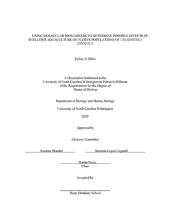
Abstract
Oysters are a keystone ecological species that generate numerous direct and indirect ecosystem services. They are also an important species economically, generating over 150 million dollars in 2014, which has led to the rapid expansion of aquaculture facilities and sites throughout the world. However, oyster aquaculture reefs my pose specific and/or novel difficulties for native oyster populations in surrounding areas. The change in regulation of genes within the Crassostrea virginica genus relating to metabolism, immunity, and cellular stress can be used as indicators, or molecular biomarkers, to determine whether the oyster is being exposed to harmful biotic or abiotic factors. The aim of this study is to use these established biomarkers to determine if possible changes to wild oyster gene expression can be attributed to the presence of shellfish aquaculture operations. In a study conducted in Big Bay, North Carolina, the expression levels of 7 genes were used as biomarkers of stress (AS6, KCrec, EDL, HSP70, PRDX6, GS, and SUP) their expression levels were then analyzed using qPCR. Differences in gene expression between control and potentially impacted sites, in gill tissue, was found for the EDL, HSP70, PRDX6 and GS genes. Differences in gene expression between seasons, in gill tissue, was found for the AS6, and KCrec genes. Body tissue was less sensitive, with only two genes showing differential expression (PRDX6 and SUP). This research shows that there is a difference in gene expression between naturally occurring reefs that are closer to aquaculture sites and naturally occurring reefs that are farther from aquaculture sites, supporting their continued use as molecular biomarkers of stress in oysters.
About this resource
This thesis was developed by Kelsey S. Billet in partial fulfillment of the requirements for the degree of Master of Science from the Department of Biology and Marine Biology, University of North Carolina at Wilmington. Kelsey was advised by Susanne Brander and Marin Posey, and her field and lab work was partially supported by a grant from the Science Collaborative. This research contributed to studies about the ecological impacts and benefits of oyster farms, which can inform the siting and permitting for shellfish aquaculture operations.
Billet, Kelsey S. 2020. Using molecular biomarkers to determine possible effects of shellfish aquaculture on native populations of crassostrea virginica. MS Thesis, University of North Carolina - Wilmington.